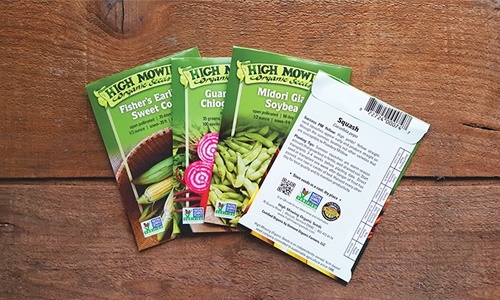

Albert Lea sells Non-GMO Project verified varieties of organic oats, rye, wheat and barley.
“We started with seed varieties we could get a handle on,” Ehrhardt said. “Once we know what it takes, we will move forward on others.”
The verification process was not that difficult, said Matt Leavitt, who handles organic certification for Albert Lea Seed House.
“It’s not unlike organic certification and we’ve had systems in place for isolation and minimizing commingling for 20 years,” Leavitt said.
Albert Lea Seed House also plans to get corn and soybean seed varieties verified but these will be more difficult due to GMO risks in those plants.
The Non-GMO Project’s standard sets a GMO threshold of 0.25 percent for seed.
“It’s a tough standard to meet for corn and also challenging for soybeans and alfalfa” Ehrhardt added. “It has to meet expectations of consumers, but must be achievable for farmers.”
“We need a substantial amount of seed at those low levels in order to support the Project’s 0.9 percent human food threshold over the long term,” Westgate said.
Ehrhardt doesn’t yet know how his farmer customers will respond to the non-GMO verification.
“There’s huge demand for non-GMO but I question whether our farmers are interested in the label,” he said.
Iowa-based Blue River Hybrids put two of its PuraMaize pollen-blocking corn hybrids through the Non-GMO Project verification.
Blue River Hybrids President Maury Johnson sees value in the verification for providing assurance to grain buyers and as a marketing tool.
“For a farmer who is growing organic and concerned about GMO content, this is a pretty handy way to buy seed that is non-GMO verified and has minimal or no GMO content,” Johnson said. “That’s a good first step.”
Similar to Albert Lea Seed House, Johnson plans to get more seed varieties Non-GMO Project verified.
Costco Requested Non-GMO Verification
At Utah-based Mountain Valley Seed Company, retail giant Costco provided the impetus for getting seed varieties Non-GMO Project verified.
“The Non-GMO Project is very predominant in Costco and our Costco buyers wanted the verification,” Robb Baumann, Mountain Valley Seed Company partner, said. “That’s what led us to do it.”
Mountain Valley Seed Company sells 16 organic seed varieties at Costco.
Baumann said his company receives calls “every day” from people asking about GMOs. “The number one question we get is about GMOs,” he said.
Still, Bauman has mixed feelings about non-GMO verification.
“Certainly there is value in that customers see it as something good,” he added. “But it is an expense. Organic is already expensive. In a way it’s taking an organic product and putting another label on it that said the same thing twice.”
Conventional Seeds Also Non-GMO Verified
While most Non-GMO Project verified seeds are organic, there are also verified conventional varieties. Washington-based Mighty Mustard sells three varieties of non-GMO verified mustard varieties that farmers grow as cover crops to suppress weeds and increase soil organic matter.
In Oregon, Pure Seed became the first seed company to sell non-GMO verified forage seed for animal feed and turf seed varieties for golf courses and municipal parks.
General Manager Lucas Solis said his company wants to be ahead of the curve.
“GMO has become a bigger topic in turf grass and some companies are developing GMO varieties,” he said. “We see the advantage of being non-GMO from an education standpoint and we are doing our best to maintain the integrity of our products.”
Further, Solis said Non-GMO Project verification provides assurance to customers, particularly international customers in countries that have strict GMO policies.
Need for Clean, Non-GMO Seed
While there is growing interest in Non-GMO Project verification among seed companies, there aren’t many incentives for companies to have their seed verified because the Non-GMO Project focuses more on food.
“The Non-GMO Project Standard focuses on post-harvest testing, so there’s no requirement to use verified seed,” Westgate said. “The challenge is that without verified seed being required, there’s less incentive for that sector to engage.”
The Non-GMO Project has organized a Seed Advisory Committee that will examine ways to encourage more seed companies to get their products verified.
“We need to find a solution to creating more engagement,” Westgate said.
While demand for non-GMO verified seed is not that strong, the need for it is, said Westgate.
“Seeds are the foundation of the food supply, so it’s essential to preserve and build sources of clean, non-GMO seed,” she concluded.
YOU MIGHT ALSO LIKE
4 Fish We’re Overeating and What to Eat Instead
Why Doesn’t the USDA Test for Residues on Food From Monsanto’s ‘Cancer Causing’ Glyphosate?
FDA Approves Genetically Engineered Potato
Outraged Republican Senator Vows to Block Appointment of FDA Commissioner Over GMO Salmon

 233k
233k  41k
41k  Subscribe
Subscribe 